Jesus Is Compassionate
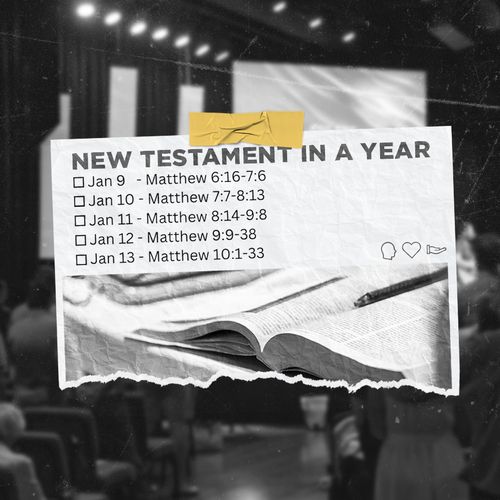
“As Jesus passed on from there, he saw a man called Matthew sitting at the tax booth, and he said to him, “Follow me.” And he rose and followed him. And as Jesus reclined at table in the house, behold, many tax collectors and sinners came and were reclining with Jesus and his disciples. And when the Pharisees saw this, they said to his disciples, “Why does your teacher eat with tax collectors and sinners?” But when he heard it, he said, “Those who are well have no need of a physician, but those who are sick. Go and learn what this means: ‘I desire mercy, and not sacrifice.’ For I came not to call the righteous, but sinners.” Then the disciples of John came to him, saying, “Why do we and the Pharisees fast, but your disciples do not fast?” And Jesus said to them, “Can the wedding guests mourn as long as the bridegroom is with them? The days will come when the bridegroom is taken away from them, and then they will fast. No one puts a piece of unshrunk cloth on an old garment, for the patch tears away from the garment, and a worse tear is made. Neither is new wine put into old wineskins. If it is, the skins burst and the wine is spilled and the skins are destroyed. But new wine is put into fresh wineskins, and so both are preserved.” While he was saying these things to them, behold, a ruler came in and knelt before him, saying, “My daughter has just died, but come and lay your hand on her, and she will live.” And Jesus rose and followed him, with his disciples. And behold, a woman who had suffered from a discharge of blood for twelve years came up behind him and touched the fringe of his garment, for she said to herself, “If I only touch his garment, I will be made well.” Jesus turned, and seeing her he said, “Take heart, daughter; your faith has made you well.” And instantly the woman was made well. And when Jesus came to the ruler’s house and saw the flute players and the crowd making a commotion, he said, “Go away, for the girl is not dead but sleeping.” And they laughed at him. But when the crowd had been put outside, he went in and took her by the hand, and the girl arose. And the report of this went through all that district. And as Jesus passed on from there, two blind men followed him, crying aloud, “Have mercy on us, Son of David.” When he entered the house, the blind men came to him, and Jesus said to them, “Do you believe that I am able to do this?” They said to him, “Yes, Lord.” Then he touched their eyes, saying, “According to your faith be it done to you.” And their eyes were opened. And Jesus sternly warned them, “See that no one knows about it.” But they went away and spread his fame through all that district. As they were going away, behold, a demon-oppressed man who was mute was brought to him. And when the demon had been cast out, the mute man spoke. And the crowds marveled, saying, “Never was anything like this seen in Israel.” But the Pharisees said, “He casts out demons by the prince of demons.” And Jesus went throughout all the cities and villages, teaching in their synagogues and proclaiming the gospel of the kingdom and healing every disease and every affliction. When he saw the crowds, he had compassion for them, because they were harassed and helpless, like sheep without a shepherd. Then he said to his disciples, “The harvest is plentiful, but the laborers are few; therefore pray earnestly to the Lord of the harvest to send out laborers into his harvest.”
(Matthew 9:9–38)
(Matthew 9:9–38)
The Tax Booth
Matthew's call is critically significant because it demonstrates how Jesus can save even the most despised individuals. Matthew was a local tax collector who worked for the Romans and had made himself hated in doing so, yet; he still received an unexpected invitation from Jesus to follow Him. This exemplifies that no one is beyond redemption or too far gone for God's salvation. The religious leaders were taken aback upon witnessing Jesus breaking bread with those they believed to be the 'outcasts.' Listening in on their dialogue, Jesus clarified that it is not only the sinners who are unwell but also those who rely on performing religious deeds; for it is these very people He was sent here to summon.
Questions From Other Disciples
John, the Baptist's disciples, were bewildered by why Jesus' followers did not practice fasting, especially after he had just preached about it. Understanding their confusion, Jesus clarified that his disciples should refrain from following this discipline while in his presence. As the ministry of Jesus begins, the practice of fasting seems out of place, but the time was approaching when the Bridegroom would be taken away, and they would fast. Christ had come, and that changed everything, and as he inaugurated the kingdom, some things were rendered obsolete.
Two Women
The miracle stories continue with the healing of Jairus's daughter and the woman with the discharge of blood. A ruler risked his reputation for the sake of his daughter and knelt before Jesus, declaring that although his daughter had died, he believed that Jesus could bring her back to life. On his way with Jairus, Jesus encountered a woman who had been afflicted for twelve years with a condition that rendered her unclean. This woman is bold and is commended for her faith. She reasons that just touching the hem of Jesus' garment would be enough to make her well. When Jesus arrives at Jairus' house, mourners gather to lament the young girl's passing. Jesus tells the crowd to leave, saying that the girl is only sleeping; they deride him. Once the crowd has been put outside, Jesus takes the girl by the hand, and she rises. The symptoms of sin are sickness, disease, and death, but Jesus has authority and power over them all.
Two Men
The miracle of the healing of the blind men continues to identify Jesus. These men call out to the "Son of David" and ask for the restoration of their sight. This was the title used when Matthew introduced Jesus at the beginning of his Gospel; Jesus, the royal Son advancing on the kingdom of darkness. Jesus asked them if they believed he could do this for them, and they exclaimed their confidence. He commended their faith, and touching their eyes; he healed them. Jesus bid them to remain quiet, but they spread his fame throughout the region.
Demons Flee
Restoring speech to the mute man affirms the glory and uniqueness of Jesus' work. The crowds note that nothing like this has been done in Israel. The hostility and spite of the Pharisees are evident in their accusation that Jesus must have a demon to deal with demons as he does. The argument is flawed, but the hatred is real, and the kingdom of darkness against which Jesus is advancing has unexpected advocates and representatives in religious places.
Pray For Laborers
The kingdom advances as Jesus taught, proclaiming the Gospel and healing every disease and affliction. At this moment, Matthew captures the compassion of the King. He sees these people harassed and helpless, longing to be healed and comforted. These sheep desperately need the good shepherd, yet most have yet to see their spiritual need. The chapter ends with a statement about the need for laborers to go into the harvest. Jesus tells his disciples that the harvest is plentiful, but the laborers are few. He urges them to pray earnestly that the Lord of the harvest would send more laborers, although they did not fully understand they would be sent to join in the harvest.
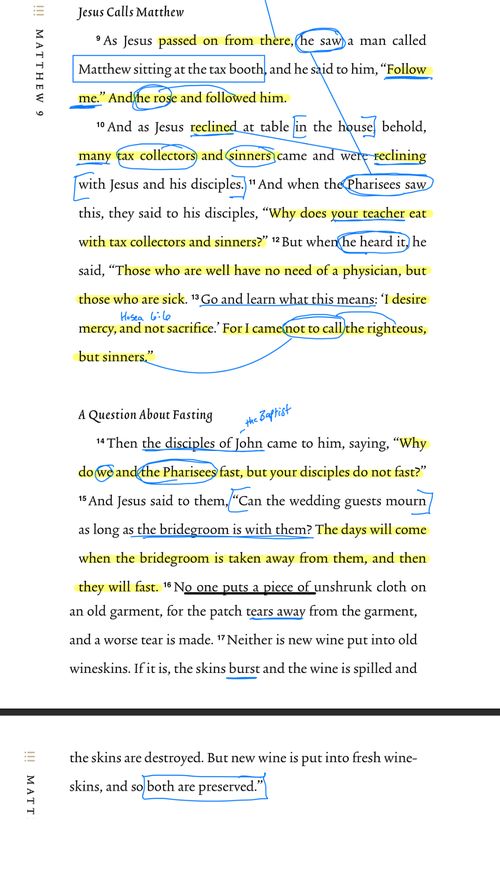
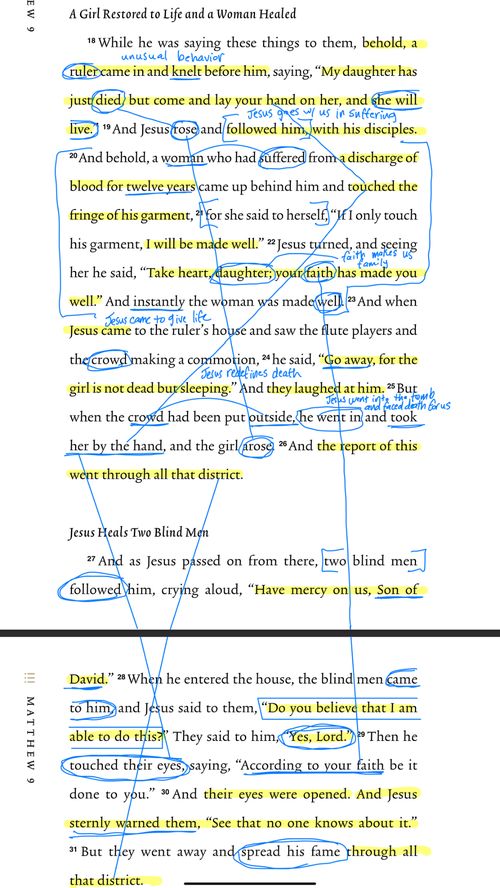
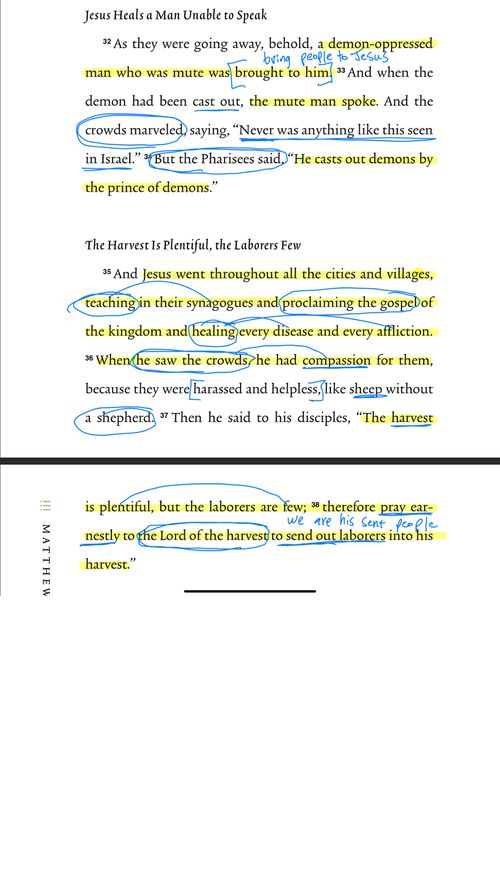

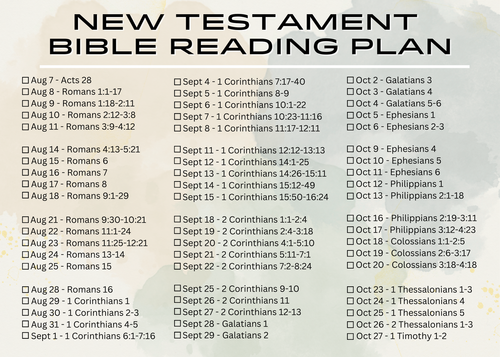
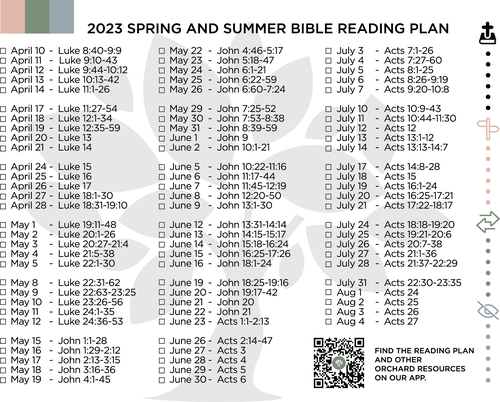
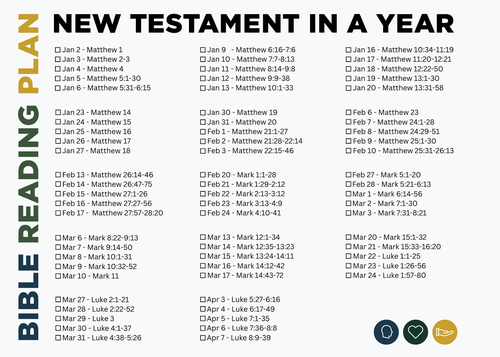
Recent
Archive
2023
January
Happy New Year!He Will Save His People From Their SinsMy Beloved SonTemptation And MinistryThe SermonLeaving, Lying, Limits, Love, Largesse, and The Lord's PrayerTreasure, Anxiety, and JudgmentAstonishing AuthorityStorms, Demons, and HealingJesus Is CompassionateHis Eye Is On The SparrowSwords, Rewards, and MessengersThe Lord of the SabbathBlasphemy, Bad Trees, Signs, and FamilyStories, Sowers, and SoilsParables, Hidden Treasure, and RejectionFame, Food, Fear, Faith, and FringeReal Issues And The Power Of GodDying To Find LifeLike The SunChildren, Temptation, Sheep, And ForgivenessMarriage, Kids, And MoneyTo Serve And Give His Life
February
The ArrivalStories That StingQuestion TrapsHidden Motives And LamentThe End...?UnexpectedReady?Punishment, The Plot, And PerfumeTreachery, Passover, and The CupBetrayal, Injustice, And DenialThe Field Of Blood And The GovernorCrucifixion And DeathAll AuthorityMark—The Beginning Of The GospelHealing, Preaching, And The Forgiveness Of SinEating With Tax Collectors, Fasting, The Sabbath, And An Escape BoatThe Twelve, Blasphemy, Family, And A ParableParables And PowerA Different Kind Of StormPower Had Gone Out
March
Death, Hunger, And MiraclesCommandment Or TraditionDo You Not Yet Understand?The Christ And A Glimpse Of His GloryUnbelief, Confusion, And SinDivorce, Children, And PossessionsTo Give His Life As A RansomHosannaThe Rejected Stone, Taxes, And The Great CommandmentDestruction And The EndNo One Knows, An Anointing, And A Promise To BetrayPassover And GethsemaneThe Kiss, Arrest, And DenialPilate, Simon, And The CrucifixionDeath, Burial, Resurrection, And What\'s NextTheophilus And A Visit From GabrielMary And The MagnificatBenedictusThe Arrival And The ShepherdsSimeon, Anna, And The SpiritFruits Keeping With Repentance And BaptismThe Wilderness, Nazareth, And CapernaumSimon's Mother-In-Law, Fishing, A Leper, And Sins
April
Tax Collectors, Fasting, Sabbath Controversies, And The TwelveWhy Do You Call Me Lord, Lord?Jesus Marveled, A Raised Son, And QuestionsA Sinful Woman And A ParableObeying The Word, A Storm, And DemonsTwelve Years, Twelve Apostles, And SpeculationGreater, Costly, And GloryNot Getting It, The Cost, And AppointedWoes, Neighbors, And What Is NecessaryHelp Us Pray And A Divided Kingdom?Signs, Lights, And WoesHypocrisy, Fear, A Fool, And AnxietyParables, Division, And The TimesWarnings, A Daughter Of Abraham, And Jerusalem, JerusalemA Son Or An Ox, Parties, And DiscipleshipLost ThingsThe Dishonest Manager, The Law, And Anguish In This FlameMillstones And Mustard SeedsPersistent Prayer, Humility, A Childlike Faith, And The Rich RulerEverything That Is Written, A Blind Beggar, And A Wee Little Man
May
A Parable, A Colt, A Prophecy, And A CleansingAuthority, Wicked Tenants, And TaxesThings To Beware Of And WidowsDestruction, Persecution, The Son Of Man, And WatchingThe Plot, Betrayal, Lord's Supper, And Inappropriate BehaviorPrediction, Fulfillment, Agony, Betrayal, And DenialMistreated, Taken Before The Council, Pilate, Herod, And Delivered To Be CrucifiedCrucifixion, Death, And BurialHe Is Not HereDisbelieved For JoyIn The Beginning…The Lamb Of God And A WeddingZeal, What's Inside, And Born AgainHe Must Increase
Categories
no categories
Tags
no tags
